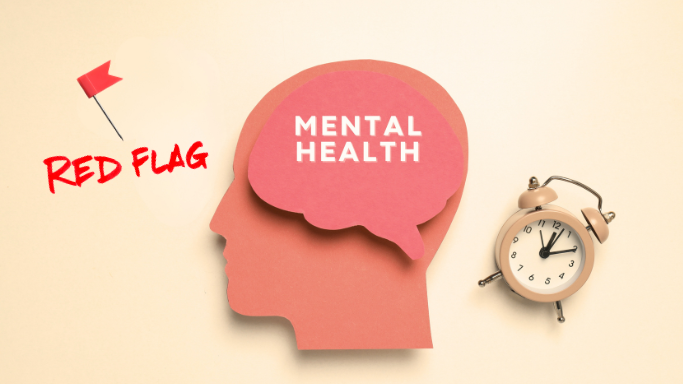Am I Just Tired or Is My Mental Health Getting Worse?
You know that feeling when something’s just... off? You can’t quite put your finger on it… you’re not bad, but you’re definitely not your usual self. Maybe you’re more tired than usual, snapping at people, doom scrolling more than usual or just going through the motions. It’s easy to ignore, but sometimes those little changes are your mind’s way of waving a red flag.
How to Know If Your Mental Health Is Getting Worse?
Mental health struggles don’t always show up in obvious ways. You might still be going to work, texting friends, or even smiling and laughing. But something inside might feel different. More often than not, a decline in mental health starts with small changes. Maybe you’re more tired than usual, find it harder to focus, feel more irritable, or start pulling away from people or activities you used to enjoy.
These changes might not seem like a big deal at first, but over time, they can build up and become harder to manage. That’s why it’s so important to notice when something feels “off.” Catching these early signs can help you take action before things get worse. In the next section, we’ll go over some of the common signs that your mental health might be declining, and why it’s worth paying attention to them.
Early Warning Signs of Mental Health Decline
It’s easy to overlook early signs you might be mentally unwell. You might chalk it up to stress, lack of sleep, or being “just tired.” But ongoing changes (even if small) can be early signs that your mental health needs attention.
Physical Signs of Mental Health Decline:
Frequent headaches or jaw tension
You might notice you’re tense all the time and also clenching your jaw without realizing it, especially at night or during the day at work. This is a sign that your body is holding onto trauma, anxiety, stress or unresolved emotion — often trying to stay in control or stay safe in an environment that feels overwhelming.
Feeling “wired but tired”
You feel exhausted but can’t relax or fall asleep, almost like your body is on high alert even when you’re resting.
Unexplained stomach issues
Ongoing nausea, bloating, or bathroom changes can be stress-related, especially if there’s no medical cause.
Forgetting to drink water, skipping meals, noticing you need to use the washroom at the very last minute
These are signs that you’re disconnected from your body. This often happens when your nervous system is in survival mode — like fight, flight, or freeze.
Emotional Signs That Your Mental Health Is Getting Worse
Feeling numb or emotionally “flat”
You’re not sad or angry... you just don’t feel much of anything, even during moments that used to matter.
Getting easily startled or overwhelmed
Small things (like a loud noise or a last-minute schedule change) suddenly feel hard to cope with.
Crying unexpectedly or feeling on edge
You tear up during a commercial or feel irritable at small things, like a slow driver or loud chewing.
Increased self-criticism
You find yourself thinking things like “I can’t do anything right” or replaying small mistakes in your head long after they happen.
Behavioural Signs Your Mental Health Is Declining:
Procrastinating tasks you used to handle easily
A simple email reply or household chore feels too overwhelming, so you keep putting it off.
Over-scheduling or staying constantly “busy”
You avoid being alone with your thoughts by packing your calendar or working late, even when you’re exhausted.
Doom scrolling or binge-watching more than usual
You lose track of time on your phone or watching shows. This may not necessarily be to relax, but rather to distract yourself or numb out.
Avoiding people you care about
You stop replying to texts or cancel plans — not because you don’t care, but because it feels too draining.
These mental health red flags can be easy to miss because they often blend into daily life. But if these warning signs of mental health issues persist for more than a couple of weeks, it’s worth exploring therapy for early mental health symptoms.
Why It’s Important to Take Early Signs Seriously and How Therapy Can Help?
Addressing mental health decline early can prevent bigger issues later. Therapy helps you build emotional resilience, understand patterns, and gain skills to cope effectively. You don’t have to wait for things to get “really bad.” In fact, therapy is most effective when it’s used proactively.
At this stage, therapy can offer:
A safe space to process what you're feeling
Practical strategies to manage anxiety, low mood, or stress
Support in navigating relationships or life transitions
Tools to understand patterns and rebuild self-confidence
At TCC, our therapists use a range of proven modalities including Cognitive Behavioural Therapy (CBT), Somatic Therapy, EMDR, trauma-informed care and other therapeutic approaches tailored according to your specific needs. We also offer culturally responsive therapy, which is designed to support people from diverse cultural and lived experiences.
We offer free 15-minute therapy consultations across Canada and reduced rate fees so that support is accessible when you need it most.
Additional Mental Health Supports in Canada
If you're in Calgary and looking for free or affordable mental health support, check out our full guide to low-cost therapy resources across Canada.
And here are some other great starting points:
Calgary Counselling Centre – Sliding-scale therapy for individuals and families
Distress Centre Calgary – 24/7 crisis support and short-term counselling
Women’s Centre of Calgary – Free programs and counselling for women
Wood’s Homes – Walk-in therapy clinics for youth and families
TCC Therapy Services (our clinic) – Culturally-responsive therapy with flexible pricing
Too Long; Didn’t Read:
Mental health decline often starts with small red flags
Emotional, physical, and behavioural changes are all warning signs of mental health issues
If they last longer than two weeks, they’re worth taking seriously
Early therapy helps prevent worsening symptoms and builds resilience
Free and low-cost mental health support is available in Calgary, including at our clinic
Conclusion:
You don’t need to be in crisis to deserve care. If you’ve been wondering whether your mental health is getting worse, that’s reason enough to pause and reflect. Subtle shifts are still valid and they’re often the first sign that something deeper needs attention. Early support through therapy can help you stay grounded, reconnect with yourself, and move forward with clarity and confidence. You’re not alone, and support is here when you’re ready.
References:
Healthdirect Australia. (n.d.). Signs of mental health issues. Retrieved from https://www.healthdirect.gov.au/signs-of-mental-health-issues
Gaskin, C. J. (2015). Recognising Signs of Deterioration in a Person’s Mental State: Final Report. Australian Commission on Safety and Quality in Health Care. Retrieved from https://www.safetyandquality.gov.au/sites/default/files/migrated/Recognising-Signs-of-Deterioration-in-a-Persons-Mental-State-Gaskin-Research-Final-Report.pdf
Medical News Today. (2023). What are the early signs of mental health problems? Retrieved from https://www.medicalnewstoday.com/articles/154543



